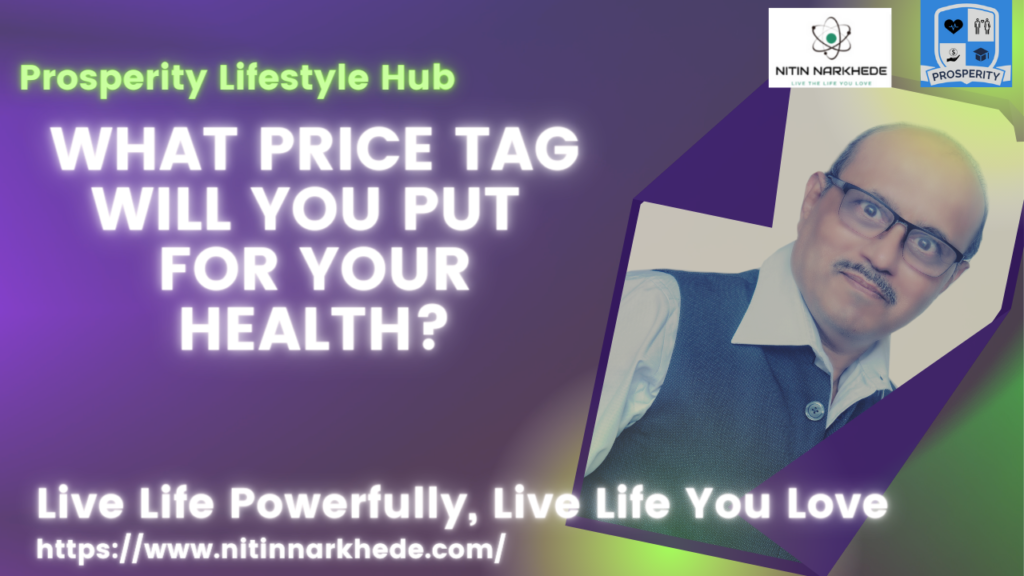
We hear over and over again how important it is to maintain a healthy lifestyle. But being healthy for its own sake isn’t easy Mostly we do not take actions due to procrastination.
Today we are going to discuss on the topic “What Price tag will you put for your health ?”
We are going to discuss today on topics below
How ignorance cuts India’s healthy life by half? how your health habits might be affecting your bottom line? How the monetary benefits of a healthy lifestyle may offer helpful incentive?
HI This is Nitin Narkhede, Founder of Prosperity Lifestyle Hub. Technocrat turned Mentor to help Professionals Identify How to Live a Fulfilling life. Live Life Powerfully, Live Life you Love.
Let’s dive in,
Every Most of us want to have a Healthy, Joyful, Happening Life, But There many things that do not allow you to achieve Lifestyle of your dreams.
Millions of people follow an unhealthy lifestyle. Many of them encounter illness, disability and even death. Problems like metabolic diseases, joint and skeletal problems, cardio-vascular diseases, hypertension, overweight, violence and so on, These are few effects caused by an unhealthy lifestyle.
How ignorance cuts healthy life by half?
When we give blessings to someone, We wish for long life beyond 100.
Towns and cities across world are seeing a steady rise in the prevalence of non-communicable diseases because of a lack of awareness.
According to the Global Burden of Disease study in 2013, Indian men could expect to live to 64.2 years, 6.9 years longer than in 1990, Indian women could expect to live to 68.5 years, 10.3 years longer than in 1990. Similar are results across the globe.
There is a Great News that longevity Increased over the years because of developments in medial field. Men gained 6.4 years in healthy life expectancy while women gained 8.9 years. But it do not state “healthy life expectancy”–Instead of a health measure that calculates how many years a person might live is to be changed to How much in good health they live. A gap between the increase in life expectancy and healthy life expectancy indicates that people will lose some years of their life to disease or injury.
Being healthy not only makes you feel good, it may also help you financially. Study found that the people who have Body mass index above 30 found a steep increase in annual medical expenditures.
Now if you ask yourself how your health habits might be affecting your bottom line, You can see how the below 5 points affecting Physical and Financial health-
- Regular preventative care can help reduce potential healthcare costs. Even minor illnesses can lead to missed work, missed opportunities, and potentially lost wages.
- Serious illnesses often involve major costs like hospital stays, medical equipment, and doctor’s fees.
- Dental Costs can be lowered by receiving regular checkups and performing basic preventative care.
- When poor health persists over long period of time, Lost earnings may makes it harder to save for retirement.
- Some habits that lead to poor health can be expensive in themselves. Smoking is a classic example. Smokers also pay higher premiums for health care and life insurance, and their houses, cars, and other possessions tend to devalue at a quicker rate because of damage from smoking.
- Total Spending on smoking is more than $300 billion in a year, including nearly $225 billion in direct medical care for adults in this world.
- Obesity is another expensive condition that affects many. Adults spend $1,429 more per year on direct healthcare costs than do adults with a healthy weight.
By focusing on your health, eliminating harmful habits, and employing preventative care, you may be able to improve your self-confidence and quality of life. You may also be able to reduce expenses, enjoy more of your money, and boost your overall financial health.
How to FIND BALANCE?
What is STEEP Framework ? it is a analytical framework outlined in 2001 by the Institute of Medicine (now called the Health and Medicine Division) . It is widely adopted by health care providers
STEEP is commonly used to gain an insight into past, current and future of the external environment developments during times of uncertainty,
- Safe. Avoid injuries to patients from the care that is intended to help them.
- Timely. Reduce waits and sometimes harmful delays for both those who receive and those who give care.
- Effective. Provide services based on scientific knowledge to all who could benefit and refrain from providing services to those not likely to benefit.
- Efficient. Avoid waste, including waste of equipment, supplies, ideas and energy.
- Patient-centered. Provide care that is respectful of and responsive to individual patient preferences, needs and values, and ensure that patient values guide all clinical decisions.
- Equitable. Provide care that does not vary in quality because of personal characteristics such as gender, ethnicity, geographic location and socioeconomic status.
Affluent, educated and well-informed urban Indians should be healthier. They can afford healthy diets and are empowered to make the right choices, or so you would think.
Towns and cities across world are seeing a steady rise in the prevalence of non-communicable diseases because of a lack of awareness.
Most of us have heard about non-communicable diseases, But hearing about something doesn’t constitute sufficient awareness to live healthy. We ignore information and do nothing when they hear too much, said David Katz, Yale University researcher and authority on nutrition, weight management and the prevention of chronic disease. Contradictory messages—one day, you hear, coffee is good for you, the next day it’s bad—especially cause people to switch off.
Most of us are far from this level of awareness. According to the CDC:
- 28% of those who are diabetic, don’t know it
- 89% of those who are prediabetic, don’t know it
- 53% of those who are hypertensive, don’t know it
- Most of those who have a cholesterol disorder, don’t know it
- 45% of adult men don’t even have a PCP, let alone use one
- Undiagnosed and uncontrolled chronic conditions are driving most health care costs
- Most of the adults who should get a preventive care checkup this year will not
Preventative health messages should be simple and consistent, such as: Eat five servings of fruits and vegetables daily. Exercise 30 minutes a day, five days a week. Cut down on sugar and salt. Avoid processed foods. Quit smoking. Limit yourself to a drink a day.
To become serious about health, people must be clear about the burden of non-communicable diseases, the importance of early diagnosis and preventive steps. Only then will people undergo regular health checks, vital because chronic diseases stay asymptomatic for many years or present very minor symptoms that are neglected or taken for signs of ageing.
What is ignorance harmful?
What are unintended consequences from ignorance? First-order effects of ignorance include incorrect decisions. Second-order effects include not understanding why the decisions are incorrect. These decisions can lead to worse outcomes in the future
Is ignorance a choice?
Ignorance is not an excuse, it’s a choice.
You choose it every time you refuse to make an improvement in yourself. You chose it every time you see someone being ignorant and allowing this ignorance to affect your life.
What are the 3 types of ignorance?
Ignorance can appear in three different types: factual ignorance (absence of knowledge of some fact), object ignorance (unacquaintance with some object), and technical ignorance (absence of knowledge of how to do something).
What are the 2 kinds of ignorance?
The first category of ignorance is when we do not know we are ignorant. This is primary ignorance. The second category of ignorance is when we recognize our ignorance.
How do I stop being ignorant?
- 5 Science-Backed Ways to Overcome Ignorance. …
- Feed Your Mind with Digestible Information. …
- Ask Yourself Honest, Yet Sometimes Uncomfortable Questions. …
- Become Super-Forecasters by Collaborating With Others. …
- Constantly Look for Alternative Opinions. …
- Curb the Impulse to Assign Judgments to Events.
In business, there is an old saying – “You can’t manage what you can’t measure.” In terms of health management, even when we can measure it, we don’t. If we are not aware what issues confront each of us, it will cost us in terms of the quality and length of our lives and in terms of the impact on American society. We can no longer afford to be fat, dumb and unhappy. We can blame our government or our doctor or our health plan or marketers of fast food and sugary drinks, but the real villain is the person we see in the mirror each morning.
The first step in addressing our health is understanding our health status. We should stop being reactive to what happens to us and We should manage our health with same passion with which we talk about cricket or football match or political situation. We should develop or use Health management tools for monitoring our daily Habits. This is a very vast topic and we can go on discussing on the topic more and more.
So what we have seen How being ignorant about our health is paying huge cost. We need to put some price tag to our Life. As soon as we start loving Our Self, We start taking action towards our Health Goals, this in turn stop procrastination. We start seeing a different energy flowing through us .
That’s all in this Topic for now, We will come with another interesting topic soon which is really near to our Hearts.

